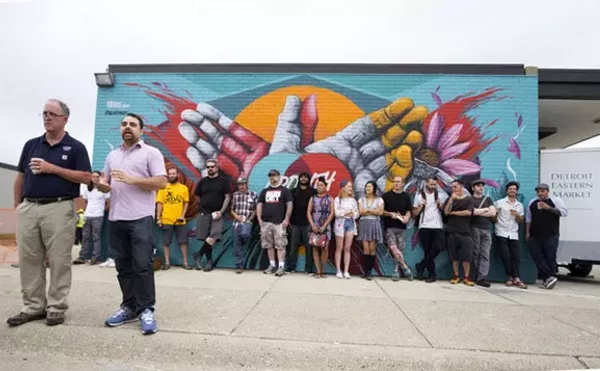
Audio By Carbonatix
[
{
"name": "GPT - Leaderboard - Inline - Content",
"component": "35519556",
"insertPoint": "5th",
"startingPoint": "3",
"requiredCountToDisplay": "3",
"maxInsertions": 100,
"adList": [
{
"adPreset": "LeaderboardInline"
}
]
}
]
Walt Whitman wrote "I hear America singing" in Leaves of Grass, which is as close to a true national anthem as we’re likely ever to have bestowed upon us as a people. We’re so different and crotchety and little tolerant of each other, yet hell-bent – each and every one – on expressing fully, independently, violently if necessary, with guns and truck bombs and chains and clubs, whatever the hell it is that we know in our heart of hearts it means to be American.
"I hear America singing, the varied carols I hear … Each singing what belongs to him or her and to none else …"
That hymn has carried us to where we find ourselves today, not precisely comprehending where we are, maybe not always happy to be here, but intent upon that song we each sing, independently, man and woman and child: "what belongs to him or her and to none else."
I’m talking about the mall, of course, which is where the national singing mostly gets done nowadays. Statistically speaking, the majority of us haven’t been city dwellers for 20 years or more, since we began the national exodus to the suburbs.
Now, the mall is where it’s at – out where "the country" used to be. Nature, in other words – fields and forests and streams – before it all got paved over.
We memorialize nature’s passing with unself-consciously ironic names for asphalt streets and treeless subdivisions – Forest Glen, River Bend – that refer to things we destroyed to make room for our way of life. The names may be phony, but they reveal a nostalgia that is real (and profitable); and that’s what might bring you to the Natural Wonders store, for example.
The chain started in 1986, in California; today it has 178 stores nationwide, three in exurban Detroit. The chain’s first quarter net sales for 1999 were $21,552,000.
"Did you have any questions, any concerns?" the solicitous young clerk inquires. Well, of course we’ve got concerns; that’s why any mall of consequence now has at least one of these places, selling little souvenirs of the natural world that we feel ever more disconnected from and – millennially speaking – ever more threatened by.
Which explains the line of products. They tend either toward the scientific (telescopes, globes, rock samples, "genuine fossils") or else the therapeutic (cuddly stuffed animals, hummingbird videos, candles, desktop minifountains).
Either way, we’re trying to feel comfy and in control, it seems, in the presence of a nature that we’ve given every reason to be really pissed off at us and what we’ve made of it. "My Way" and the freeway, to borrow a tag from Frank Sinatra, describes the ecology of our national sing-song.
It’s pretty much the same drill at the Nature Company, with its gurgling fountain and plastic froggie that croaks a hello as you enter. The Nature Company (now part of Discovery Communications, owners of the Discovery Channel) is a chain of more than 120 stores in the United States, Canada, United Kingdom and Japan. It was founded in 1971 in Berkeley, Calif., by two former Peace Corps members.
Here too the products are pitched toward mitigating our "concerns." In addition to rocks and science gizmos and cuddly animals, you will find a number of attitudinally correct Zen appliances, such as little fountains and sand gardens for your desk.
The Nature Company’s Web page will tell you about corporate efforts on behalf of the environment: "(W)e do use bubble wrap made from completely recycled material."
It’s appealing that we can buy our way back into a state of harmony and natural grace, what with Y2K breathing down our necks (and attendant fantasies, on TV and at the movies, of eco-plagues yet to come).
But there’s something vaguely smarmy about all this feel-good, prophylactic magic and the New Agey music perpetually playing on the CD.
Could this be what America is really singing? No, sir. For that, you’ll have follow the center of population through vast, deforested fields of monster-house subdivisions, to the Bass Pro Shop and Outdoor World, one of only six such emporia in the country. At 150,000 square feet, with more than 300 employees, this store is an epic undertaking: Overblown, overstocked, oversized, over-the-top (stuffed critters, insistent Up North decor, 30,000-gallon aquarium, electronic shooting gallery).
This is no mere store; this is America. You won’t have to settle for silly prosthetics here (although you can buy stuffed, toy animal heads, ready for wall mounting).
This place is the real thing: guns and ammo, bows and camouflage suits (including infant sizes, with lace-trimmed collars for little girls), golf clubs and fishing gear and campers, boats and lures and hiking boots and tents and rations for the trail, or the apocalypse. All for sale, in this one gigantic "world": The commercial equivalent of America’s discordant, operatic plenitude.
When it comes to "concerns," if the Nature outlets are a dose of valium, this joint is a shot of pure speed.
It’s not understanding we’re being offered here (no candles or geodes or feng shui). This store is about power and the tools that got us to where we are, as Americans. (It even has an in-house firing range just upstairs.)
There’s this poem by Allen Ginsberg, another American prophet. "A Supermarket in California," the poem is called; in it, Ginsberg imagines wandering through a supermarket with Walt Whitman, at midnight, squeezing the fruit, asking Walt questions: "Will we stroll dreaming of the lost America of love past blue automobiles in driveways, home to our silent cottage?"
On my way home, I drive past a little, impromptu pond created by a freeway embankment. A heron is wading around, looking for frogs. Tonight I’ll dream of the lost America, of Natural Wonders and the Nature Company, and the white heron, and Bass Pro.
I’ll hear America singing; I’ll feel the deep harmony of things. Or not.





